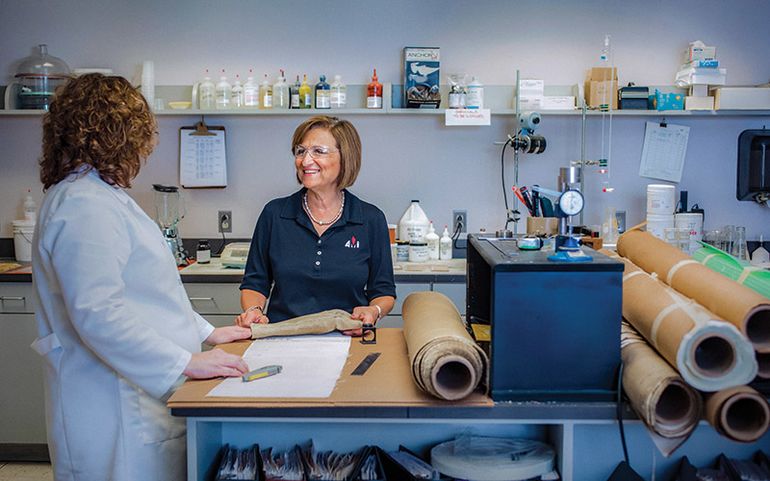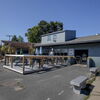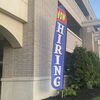At Auburn Manufacturing, Kathie Leonard stokes a global market for heat-resistant materials
On any given day, Auburn Manufacturing Inc. CEO and President Kathie Leonard has a packed schedule, managing operations at Auburn Manufacturing's locations in Auburn and Mechanic Falls, overseeing product development, planning for expansions of facilities and equipment and seeking new ways to streamline operations.
Running a business-to-business operation, she's on top of the latest in high-tech fibers and enhancement technologies that come in, and the ever-growing product variations designed to meet customers' specific needs. Recently, she was expecting that portfolio to grow, thanks to the federal government's new tax law, which is expected to result in new capital investments in equipment throughout industries she serves.
“That requires materials that our products are used in,” she says. “So we're seeing much higher demand for our fabrics” since the fourth quarter of 2017. That's resulted in her latest plan to invest $500,000 over the coming year in new equipment, including yarn-making and yarn-handling machines, to increase capacity; plus, with an outside consultant, she's been examining operational efficiencies to maximize workflow. At the same time, as a member of the National Council of Textile Organizations and the U.S. Department of Commerce's Industry Trade Advisory Committee on Textiles and Clothing, she makes frequent treks to Washington, D.C., to provide a New England voice on global trade issues.
Leonard expresses her company's drive in the catchy tagline “Innovation on fire.” It seems Leonard herself is a fiery force of nature.
“She is a force to be reckoned with, as far as thinking strategically and managing the business,” says Wayne Messer, a senior project manager with the Maine Manufacturing Extension Partnership, which in 2017 awarded Leonard its Manufacturing Excellence Award of the Year. Messer has worked with Leonard on lean process management since 2011. “I get emails from her at 3 o'clock in the morning,” Messer says. “I don't think she ever sleeps. She understands her business very well. And she's a great spokesperson not only for Auburn Manufacturing but for manufacturing in general for the state of Maine and for New England.”
Hot products
Auburn Manufacturing develops, manufactures and markets textile products for extreme-temperature industrial applications. Industries served include oil-and-petrochemical refining and drilling, steel and aluminum foundries, paper-making plants and power-generating facilities — all extreme-heat situations requiring super-protective materials to protect workers from burns and facilities from fire, while providing energy-saving insulation. More recent applications include glass and mirror manufacturing, data centers for fire protection and fire safety in the use of pyrotechnics in the entertainment industry. Its textile forms include tapes, ropes and fabricated blankets, curtains and pads.
Leonard started the company in 1979 in a small space above a public library. With asbestos having been banned, there was an immediate need for heat-resistant materials.
Today, Auburn Manufacturing is a leader in its field, turning 1.5 million pounds of fiber per year into over 2 million yards of fabric, in turn supplying multiple industries with hundreds of product lines.
In recent years, Leonard took on China in a trade lawsuit that challenged subsidized products dumped on the U.S. market — and she won.
Not an obvious choice
Manufacturing was not an obvious choice for Leonard when she started her career. The Michigan native's introduction to textiles was when she was 22, working as an executive secretary at W.S. Libbey in Lewiston. Asbestos was on its way out and Leonard realized new fabrics had the potential to fill that market. In 1979, at age 27, she founded Auburn Manufacturing along with a colleague, making fabrics for insulation, clothing and welding safety that could withstand extreme temperatures. In the beginning, the company subcontracted the manufacture of fabric, then converted it into smaller rolls.
“We started selling what's called 'tapes.' It looks like masking tape, only it's fabric,” she says. “We only needed one piece of equipment to do that. That was our manufacturing plant. The rent was only $110 a month, so there wasn't a whole lot of overhead.”
In the first year, the company had revenue of $50,000, then $300,000 in its second year.
Expanding the market
With sales rapidly picking up, Auburn Manufacturing initially moved to a 5,000-square-foot building in Mechanic Falls, then within a few years built a Mechanic Falls plant of 10,000 square feet. In 1996, she built a 30,000-square-foot plant in Auburn. The two plants have since expanded to 50,000 square feet each.
In 2000, Leonard bought out her partner, who was retiring.
Leonard built the market by getting in front of end-users through phone calls, direct mail, trade shows and participation in industry associations, reaching out across the United States, then around the world.
“[We'd] get a list of all the petrochemical plants,” she explains. “You'd call and say, 'I make a product that replaces asbestos.'”
The development of new products has always been a team effort, using in-house expertise, consultants, supplier input and collaboration with other industry leaders. That's led to advances such as incorporating fiberglass to make a combination of fiberglass with Nomex, a nylon-like fabric that replaced asbestos. The combination yarn offered fiberglass's higher heat-resistance with Nomex's superior pliability and strength. New coatings and various yarn manipulations have enhanced qualities like heat-resistance and fiber cohesion. The company developed a way to transform fiberglass to pure silica that takes extremely high temperatures, up to 3,000 degrees, for applications like ship-welding and steel-making. More recently, Auburn Manufacturing has been converting fabric into finished products through its capacity to cut, sew, quilt and layer, catering to niche and one-off markets.
The China factor
When Leonard hits a stumbling block, she hits back — hard. A major obstacle appeared in recent years, when China was flooding the U.S. market with low-cost silica fabric. Auburn Manufacturing is the largest U.S. manufacturer of silica fabric, and the principal supplier of the material to the U.S. Navy. At first, Leonard wasn't worried.
“Their branding was awful,” she says. “They'd come to trade shows with a suitcase of fabrics, and it looked terrible.”
But over time, the products and presentation improved, and U.S. companies formed to funnel the Chinese fabric into the market as “American made.” In three years, Auburn Manufacturing lost 30% of its silica business.
With representation from a Washington, D.C., law firm, in January 2016, Auburn Manufacturing filed a petition with the U.S. Department of Commerce and the U.S. International Trade Commission requesting imposition of anti-dumping and countervailing duties on the Chinese fabric. In February 2017, the ITC voted in favor of Auburn Manufacturing. Chinese companies are still allowed to export to the United States, but at great expense.
“China was hit with 200% to 300% duty on these fabrics,” she says. “That's very big. We're not seeing the Chinese products coming in right now, but we now have to be vigilant to see if they're coming in through other countries.”
Business values
As business picked up, it became clear that, to retain good people, Auburn Manufacturing had to stay ahead on compensation. This was highlighted when it was discovered that the local big box store was paying more to its warehouse distribution workers. It was not a conscious decision, just a holdover from the sluggish economy. So Leonard gave everyone in the company a $2 hourly bump in pay. Other business values include leading collaboratively.
“She's a big advocate for making sure her people are well taken care of, which is not always the case in the manufacturing sector, where it can be more about the bottom line,” says Messer. “Everyone has a voice in the company and she relies on them for their input and their expertise. She provides them with the training they need in order to grow in the organization. In this economy, it's hard for businesses to find skilled employees, or employees, period. So what she's recognizing is that, if you want to grow your business, you have to invest in your employees.”
Leonard also values offering a consistent American-made product. While other manufacturers were moving jobs overseas, Leonard kept operations in Maine. She's led the evolution toward standardization in the industry, being first to embrace performance-based testing and third-party certifications. Her initiatives were recognized by U.S. Sen. Angus King, I-Maine, when he invited her to be his guest at President Barack Obama's 2015 State of the Union address.
Read more
Under Steve Levesque, Brunswick Landing delivers on a promise of creating new jobs
Joshua Broder leads fast-growing Tilson towards $77M in annual sales, hundreds of jobs
2018 Business Leaders of the Year
Under Steve Levesque, Brunswick Landing delivers on a promise of creating new jobs
Joshua Broder leads fast-growing Tilson towards $77M in annual sales, hundreds of jobs
Meet the 2018 Mainebiz Business Leaders of the Year on May 3
Thank You! So much for a great blog and best of luck for the future,
I'll be in touch and love to get improvement on
My flame-resistant workwear Product
"https://mora-flameresistantclothing.com/"
Thank You! So much for a great blog and best of luck for the future,
I'll be in touch and love to get improvement on
My <a href="https://mora-flameresistantclothing.com/">FR HI VIS SHIRT</a> Product











2 Comments